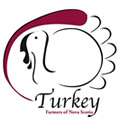TURKEY IS ONE OF TODAY’S BEST MEAT BUYS, NUTRITIONALLY AND ECONOMICALLY
The low fat content in turkey accounts for the little shrinkage in meat after roasting. A defrosted whole turkey requires only a few minutes to prepare for roasting.
Follow these four simple steps to a beautiful golden brown, ready-to-carve, mouthwatering turkey!
- THAWING: (If turkey is not frozen begin with Step 2)
NEVER THAW TURKEY AT ROOM TEMPERATURE leave turkey in original package and follow one of these methods.- REGULAR METHOD
- Place wrapped frozen turkey on a pan in refrigerator. Allow 5 hours per pound of turkey. (A 20-pound turkey will take approximately 4 days to completely thaw.)
- Refrigerate or cook turkey immediately once thawed. NEVER refreeze uncooked turkey.
- REGULAR METHOD
- PREPARATION
- Wash hands thoroughly with hot soapy water before and after handling raw turkey. All materials used for storage, preparation and serving turkey must also be cleaned before and after use. Remove plastic wrap from thawed turkey. Remove giblets and neck from body cavity. Rinse turkey inside and out with cold water and pat dry with paper towels.
- STUFFING
- Stuffing is most easily prepared separately and placed in a covered casserole dish to cook during the last hour of the turkey roasting time. For those who prefer to stuff their turkey follow these directions.
- Prepare stuffing and spoon into body cavity just before roasting. Do not pack stuffing – let it sit loosely in cavity to promote even cooking.
- Never stuff your turkey the day before it is roasted. It takes too long to heat the centre of the chilled stuffing and food spoilage organisms could accumulate.
- ROASTING
- Place turkey breast side up in roasting pan. Brush with oil or melted margarine and sprinkle outside and cavity with your favorite seasoning. Insert thermometer into the thickest part of the thigh, but be careful not to let it touch the bone.
- Roast loosely covered with foil in a preheated 325 to 350 ºF (160 to 180 º C) oven. If you choose to baste your turkey, limit the number of times you open and close your oven (once an hour is sufficient). To brown skin further remove foil approximately 1 hour before done.

